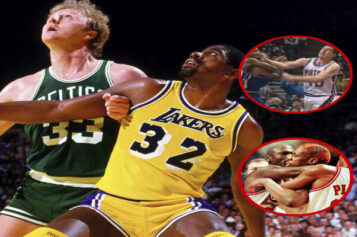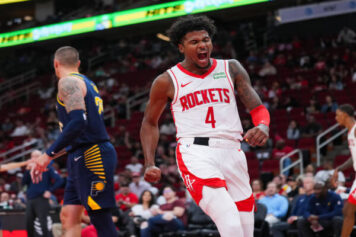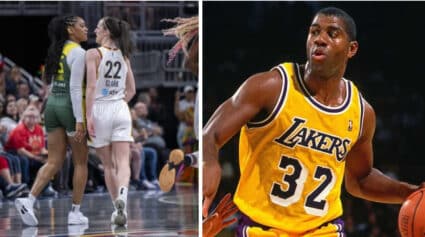After another 40-point triple double, I wake up to some musings that Harden just might be in contention for NBA’s best point guard.
According to conventional basketball wisdom, a point guard is meant to be the coach on the floor. His job is to facilitate the offense and get individuals the ball in key areas. In the past, the “guard” portion of the equation also alluded to the player being the first line of defense against the opposing guards. Additionally, point guards are supposed to protect the ball as well by avoid unnecessary turnovers, the bane of any coach’s existence.
I’ve always believed that point guards were born and not manufactured. Court vision, leadership ability and the almost clairvoyant ability to see two or three plays into the future are attributes that many say the very best in the business were capable of doing.
Though different eras bring different styles of basketball, the point guard’s job remains the same. So, when I first heard that Houston Rockets head coach Mike D’Antoni was moving incessant chucker James Harden to the point guard spot I was a little surprised. Though he averaged over seven assists per game last year, I was under the impression that Harden just dribbled the ball too much to be an effective point guard. But that was remedied by D’Antoni’s insistence that the open man be found with the basketball, and that shots are taken early in the shot clock.
Now, lo and behold, everyone is amazed at the numbers Harden is putting up – present party included. Harden’s current stats are half-past ridiculous. On the season, The Beard is averaging 27.9 points, 8.2 rebounds and 11.9 assists per game and just recorded one of the sickest triple doubles in NBA history with 53 points, 17 rebounds and 16 assists! That’s the highest point total in a triple double in NBA history, surpassing Wilt Chamberlain.
Those are incredible numbers. However, numbers do lie. And if Harden’s numbers aren’t outright telling a fib, then they’re at least misleading. While no one can question Harden’s effectiveness as a player, I’d like to take a moment to look at just how effective a point guard he is by comparing his assist to turnover ratio to other effective point guards. D’Antoni’s first point god was Steve Nash in Phoenix back in the day.
Nash won back-to-back MVP trophies in the 2004-2005 and 2005-2006 seasons.
Here’s the breakdown. 2004-2005: 15.5 points, 11.5 assists, 3.3 rebounds, 1.0 steals, 3.3 turnovers, 50.2 percent shooting, 43.1 percent from beyond the arc, and 88.7 percent from the free throw line. 2005-2006: 18.8 points, 10.5 assists per game, 4.2 rebounds, 0.8 steals, 51.2 percent shooting, 43.9 percent from beyond the arc, and 92.1 percent from the free throw line.
As the season heads toward the halfway mark, Harden’s numbers are hitting Nash’s MVP stats across the head with a lead pipe. However, from a point guard perspective, Harden’s 5.7 turnovers per game is vomit-inducing and he’s well on his way to shattering his own NBA regular season record of 4.6 turnovers per game from last season. Now, I know what people are gonna say: ‘But the pace is the reason for the turnovers.’ Okay, fair enough. The Houston Rockets are averaging 114 points per game, good for second in the NBA, and the Rockets are fourth of the league in pace at 98.2.
Comparatively, the 2004-2005 Phoenix Suns led the NBA in scoring at 110 points per game and were first in pace at 95.9 while the 2005-2006 Phoenix Suns led the league in points and pace again the following season. For those that don’t know, pace is an estimate of the total number of possessions a teams has per 48 minutes. So, while 95.9 was good enough to lead the NBA 12 years ago, that number wouldn’t even crack the top five in the league today.
Now, to add even more perspective we’ll jump in the “way back” machine and set the dial to 1988 when the Los Angeles Lakers beat the Detroit Pistons in the NBA Finals. That season the Lake Show put up 112.8 points per game (fifth in the NBA) but had a pace factor of 99.1, which didn’t even crack the top ten in the league that season. Okay, we have three instances of teams that scored a lot of points and had a lot of possessions. However, point guard Magic Johnson only averaged 3.7 turnovers per game that season.
Comparatively, Steve Nash averaged 3.3 turnovers during his first MVP campaign and 3.5 turnovers per game. Magic’s Lakers put up almost as many points as Harden’s Rockets and played at a faster pace, yet he’s averaging nearly three more turnovers per game. Nash’s Suns played at breakneck speed as well, 110 points and a 95.9 pace followed by 108.4 points and a 95.8 pace the following year.
Both Nash and Magic were the undisputed primary facilitators on their respective high octane teams, like Harden. Yet, neither of them ever averaged 4.5 turnovers per game. I know, I know…it’s not fair to compare the stats of a player that just transitioned to point guard to two of the greatest players to ever run an offense. But, seeing as though everyone is waving flags and blowing whistles in celebration of James’ point guard prowess, I felt it was necessary to look at the numbers beyond the numbers to show that point guards aren’t manufactured.
You just don’t up and become a point guard after seven years in the league. It is a life’s mission. Is James Harden a great player? Yes! Versatile? Yes! An offensive machine? Yes! But is he really a good point guard today? Yes, he’s leading the NBA in assists, but that doesn’t make him a good point guard. Hell, Wilt Chamberlain lead the league in total assists back in ’67-’68. So did that automatically make him a point guard? Don’t answer that question!
His extremely high assist to turnover ratio troubles me at this juncture. But with Houston being the hottest team in the NBA right now, having won nine of their last ten games and sitting at 30-9 overall and right on the heels of the Warriors and Spurs, Harden’s play at the point is the reason why the Rockets are having such an excellent season.
So is Harden the NBA’s best point guard right now?
The verdict is still out, but he’s making a very compelling case.



